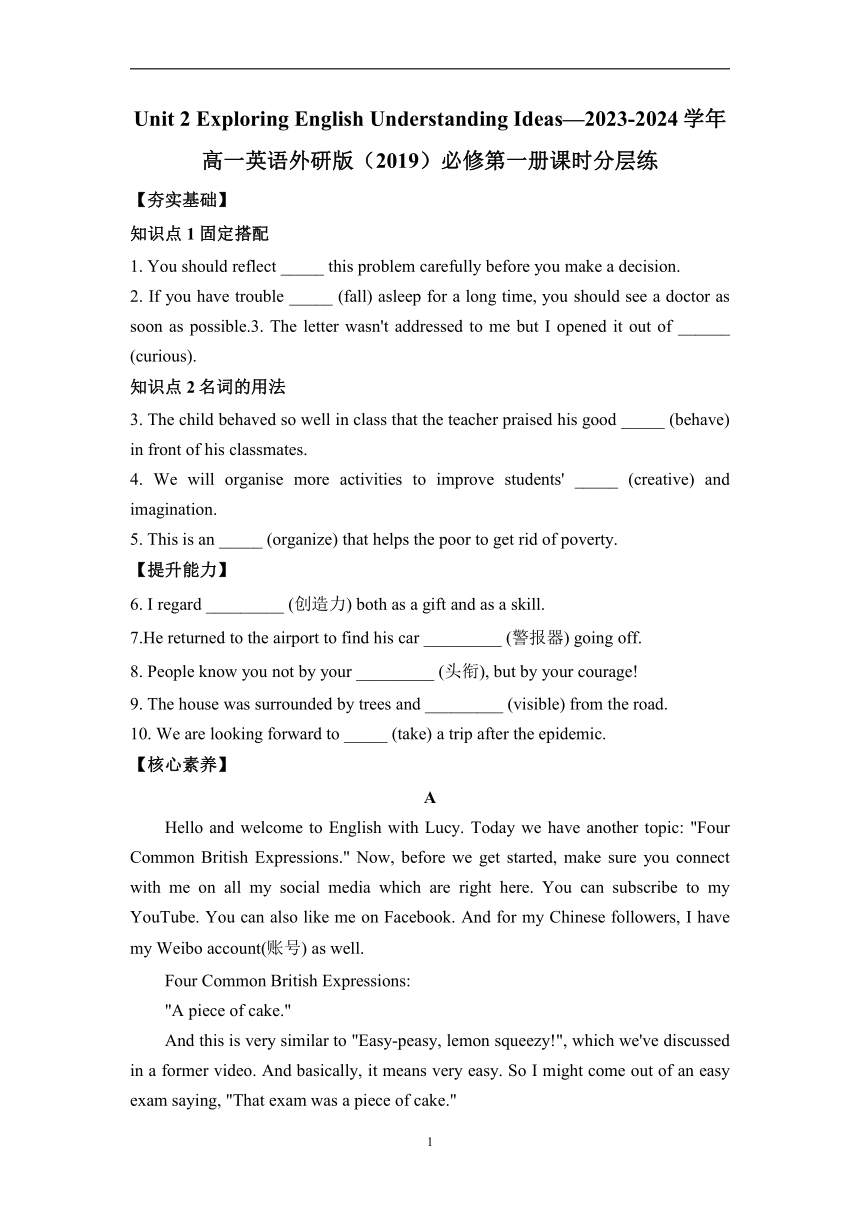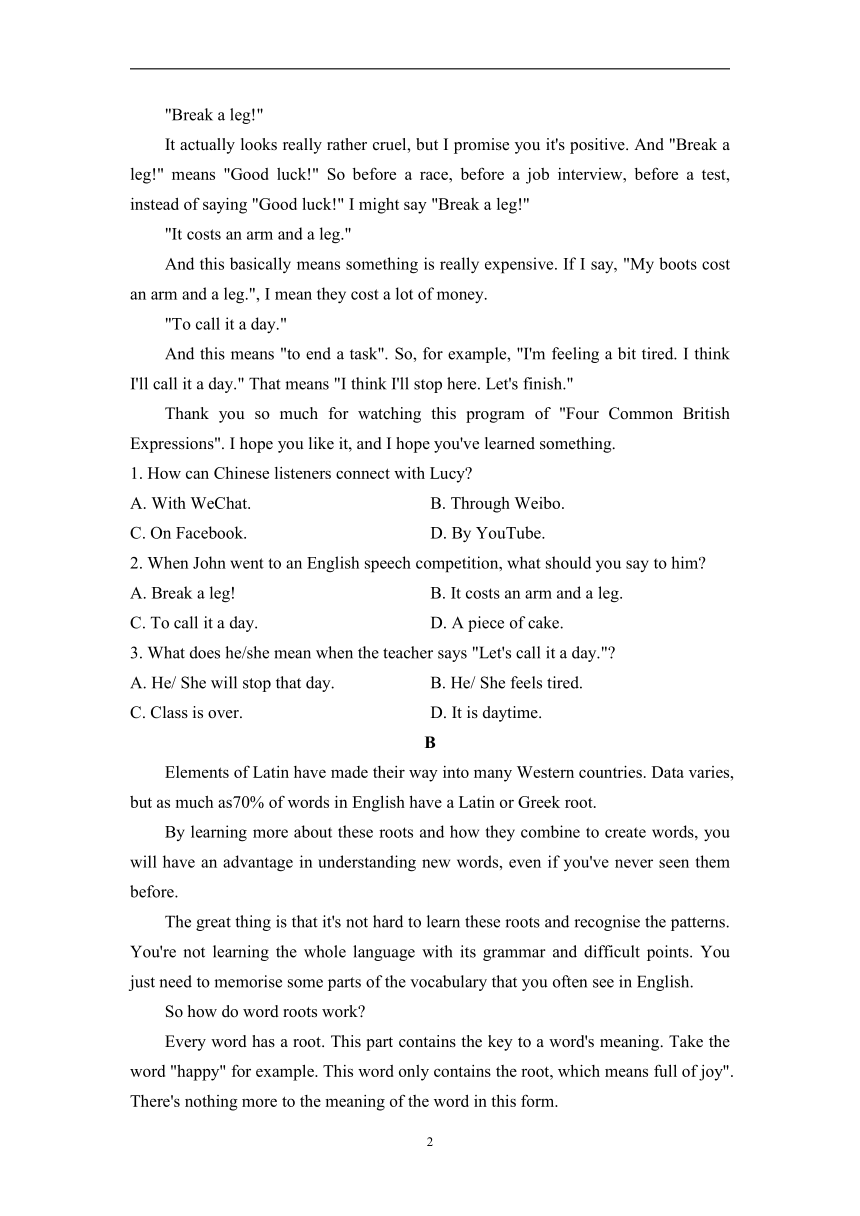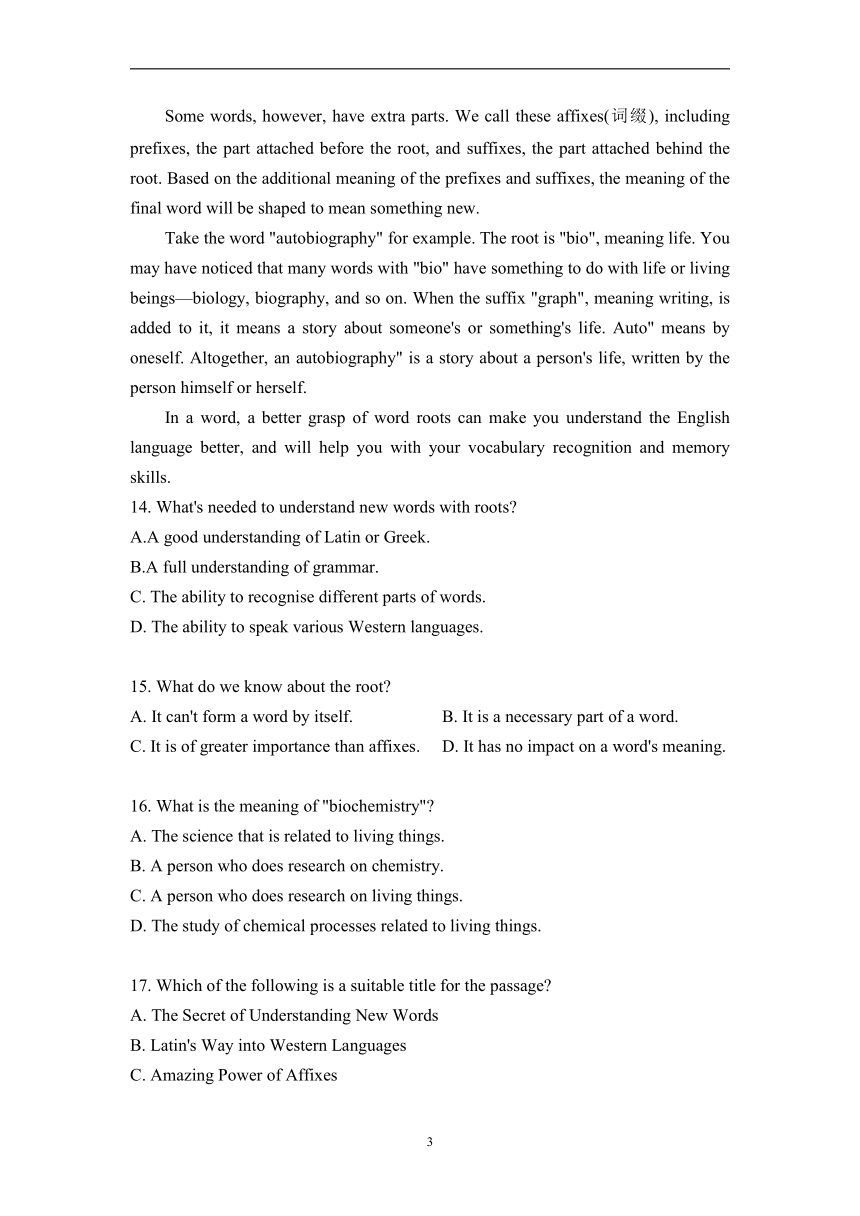外研版(2019)必修第一册Unit 2 Exploring English Understanding Ideas课时分层练(含解析)
文档属性
| 名称 | 外研版(2019)必修第一册Unit 2 Exploring English Understanding Ideas课时分层练(含解析) |  | |
| 格式 | docx | ||
| 文件大小 | 25.9KB | ||
| 资源类型 | 教案 | ||
| 版本资源 | 外研版(2019) | ||
| 科目 | 英语 | ||
| 更新时间 | 2023-09-04 16:36:40 | ||
图片预览



文档简介
Unit 2 Exploring English Understanding Ideas—2023-2024学年高一英语外研版(2019)必修第一册课时分层练
【夯实基础】
知识点1 固定搭配
1. You should reflect _____ this problem carefully before you make a decision.
2. If you have trouble _____ (fall) asleep for a long time, you should see a doctor as soon as possible.3. The letter wasn't addressed to me but I opened it out of ______ (curious).
知识点2名词的用法
3. The child behaved so well in class that the teacher praised his good _____ (behave) in front of his classmates.
4. We will organise more activities to improve students' _____ (creative) and imagination.
5. This is an _____ (organize) that helps the poor to get rid of poverty.
【提升能力】
6. I regard _________ (创造力) both as a gift and as a skill.
7.He returned to the airport to find his car _________ (警报器) going off.
8. People know you not by your _________ (头衔), but by your courage!
9. The house was surrounded by trees and _________ (visible) from the road.
10. We are looking forward to _____ (take) a trip after the epidemic.
【核心素养】
A
Hello and welcome to English with Lucy. Today we have another topic: "Four Common British Expressions." Now, before we get started, make sure you connect with me on all my social media which are right here. You can subscribe to my YouTube. You can also like me on Facebook. And for my Chinese followers, I have my Weibo account(账号) as well.
Four Common British Expressions:
"A piece of cake."
And this is very similar to "Easy-peasy, lemon squeezy!", which we've discussed in a former video. And basically, it means very easy. So I might come out of an easy exam saying, "That exam was a piece of cake."
"Break a leg!"
It actually looks really rather cruel, but I promise you it's positive. And "Break a leg!" means "Good luck!" So before a race, before a job interview, before a test, instead of saying "Good luck!" I might say "Break a leg!"
"It costs an arm and a leg."
And this basically means something is really expensive. If I say, "My boots cost an arm and a leg.", I mean they cost a lot of money.
"To call it a day."
And this means "to end a task". So, for example, "I'm feeling a bit tired. I think I'll call it a day." That means "I think I'll stop here. Let's finish."
Thank you so much for watching this program of "Four Common British Expressions". I hope you like it, and I hope you've learned something.
1. How can Chinese listeners connect with Lucy
A. With WeChat. B. Through Weibo.
C. On Facebook. D. By YouTube.
2. When John went to an English speech competition, what should you say to him
A. Break a leg! B. It costs an arm and a leg.
C. To call it a day. D. A piece of cake.
3. What does he/she mean when the teacher says "Let's call it a day."
A. He/ She will stop that day. B. He/ She feels tired.
C. Class is over. D. It is daytime.
B
Elements of Latin have made their way into many Western countries. Data varies, but as much as70% of words in English have a Latin or Greek root.
By learning more about these roots and how they combine to create words, you will have an advantage in understanding new words, even if you've never seen them before.
The great thing is that it's not hard to learn these roots and recognise the patterns. You're not learning the whole language with its grammar and difficult points. You just need to memorise some parts of the vocabulary that you often see in English.
So how do word roots work
Every word has a root. This part contains the key to a word's meaning. Take the word "happy" for example. This word only contains the root, which means full of joy". There's nothing more to the meaning of the word in this form.
Some words, however, have extra parts. We call these affixes(词缀), including prefixes, the part attached before the root, and suffixes, the part attached behind the root. Based on the additional meaning of the prefixes and suffixes, the meaning of the final word will be shaped to mean something new.
Take the word "autobiography" for example. The root is "bio", meaning life. You may have noticed that many words with "bio" have something to do with life or living beings—biology, biography, and so on. When the suffix "graph", meaning writing, is added to it, it means a story about someone's or something's life. Auto" means by oneself. Altogether, an autobiography" is a story about a person's life, written by the person himself or herself.
In a word, a better grasp of word roots can make you understand the English language better, and will help you with your vocabulary recognition and memory skills.
14. What's needed to understand new words with roots
A.A good understanding of Latin or Greek.
B.A full understanding of grammar.
C. The ability to recognise different parts of words.
D. The ability to speak various Western languages.
15. What do we know about the root
A. It can't form a word by itself. B. It is a necessary part of a word.
C. It is of greater importance than affixes. D. It has no impact on a word's meaning.
16. What is the meaning of "biochemistry"
A. The science that is related to living things.
B. A person who does research on chemistry.
C. A person who does research on living things.
D. The study of chemical processes related to living things.
17. Which of the following is a suitable title for the passage
A. The Secret of Understanding New Words
B. Latin's Way into Western Languages
C. Amazing Power of Affixes
D. Hints on Language Exams
答案以及解析
【夯实基础】
1.答案:on/upon
解析:考查介词。句意:在作决定之前你应该认真考虑一下这个问题。reflect on/upon sth.意为“认真思考某事”,故本空应用介词on或upon。
2.答案:falling
解析:考查非谓语动词。句意:如果你长时间难以入睡,你应该尽快看医生。have trouble (in) doing sth.意为“做某事有困难”,故本空应用动名词形式。
3.答案:behavio(u)r
解析:考查名词。句意:这个孩子在课堂上表现得很好,因此老师在同学们面前表扬了他的良好行为。根据空前的形容词性物主代词his和形容词good可知,此处应用名词,故填behavio(u)r。
4.答案:creativity
解析:考查名词。句意:我们将组织更多的活动来提高学生的创造力和想象力。本空和空后名词imagination 并列,共同作动词improve的宾语,故本空应用名词形式。此处表示“创造力”,故填creativity。
5.答案:organization
解析:空前是不定冠词an,设空处应填名词单数,故填organization。
【提升能力】
6.答案:creativity
解析:句意:我认为创造力既是一种天赋,也是一种技巧。creativity创造力。
7.答案:alarm
解析:句意:他回到机场时发现自己的汽车警报器响了。alarm 警报器。
8.答案:title
解析:句意:人们认识你,不是因为你的头衔,而是因为你的勇气!title题目,标题,头衔。
9.答案:invisible
解析:句意:房子被树木环绕着,并且从路上看不到。此处invisible意为“无形的,看不见的”,在句中做表语。
10.答案:taking
解析:look forward to意为“期待, 盼望”, 其中to是介词,介词之后的动词要用动词-ing形式,故填taking。
【核心素养】
A
答案:1-3 BAC
解析:1. 根据第一段中"And for my Chinese followers, I have my Weibo account(账号) as well."可知,中国听众可以通过Weibo和Lucy沟通,故选B。
2. 推理判断题。根据"Break a leg!"部分中"And 'Break a leg!' means 'Good luck!'. So before a race, before a job interview, before a test, instead of saying 'Good luck!' I might say 'Break a leg'!"可知,"eak a leg!"的意思是“祝你好运!”因此当John要参加英语演讲比赛时,该对他说“Break a leg!”。
3.细节理解题。根据"To call it a day."中"That means ' think I'll stop here. Let's finish'."可知,当老师说"Let's call it a day."时,意思是“(课已结束)下课吧。”。故选C。
B
答案:1-4 CBDA
解析:1. 细节理解题。根据第三段"The great thing is that it's not hard to learn these roots and recognise the patterns...You just need to memorise some parts of the vocabulary that you often see in English."可知,学习这些词根和认出它们并不难,你只需要记住你经常在英语词汇中看到的这些部分(词根)。由此可知,要理解有词根的新单词,就需要有识别单词不同部分的能力。故选C。
2. 细节理解题。根据第五段中的"Every word has a root. This part contains the key to a word's meaning. (每个单词都有词根。这部分包含了一个词词意的关键。) 可知,词根是构成一个单词必不可少的一部分。故选B。
3. 推理判断题。根据第七段中的"You may have noticed that many words with 'bio' have something to do with life or living beings.(你可能已经注意到,许多带有‘bio’的词与生命或生物有关。)"以及chemistry(化学)可推知,"biochemistry"的意思应当同时含有生物和化学的意思,故D项"与生物有关的化学过程的研究"符合题意。
4. 主旨大意题。根据文章结构:
第一段 介绍百分之七十的英语单词有拉丁语或希腊语词根
第二段 介绍了学习词根有利于新单词的理解
第三段 介绍了如何学习词根
第四段—第七段 介绍了词根和词缀是如何起作用的
第八段(总结) 掌握词根能更好地理解英语,帮助学习新单词
可知全文主要介绍如何通过词根和词缀来更有效地学习新词汇。A项"理解新单词的秘诀"可以作为文章的最佳标题。故选A。
2
【夯实基础】
知识点1 固定搭配
1. You should reflect _____ this problem carefully before you make a decision.
2. If you have trouble _____ (fall) asleep for a long time, you should see a doctor as soon as possible.3. The letter wasn't addressed to me but I opened it out of ______ (curious).
知识点2名词的用法
3. The child behaved so well in class that the teacher praised his good _____ (behave) in front of his classmates.
4. We will organise more activities to improve students' _____ (creative) and imagination.
5. This is an _____ (organize) that helps the poor to get rid of poverty.
【提升能力】
6. I regard _________ (创造力) both as a gift and as a skill.
7.He returned to the airport to find his car _________ (警报器) going off.
8. People know you not by your _________ (头衔), but by your courage!
9. The house was surrounded by trees and _________ (visible) from the road.
10. We are looking forward to _____ (take) a trip after the epidemic.
【核心素养】
A
Hello and welcome to English with Lucy. Today we have another topic: "Four Common British Expressions." Now, before we get started, make sure you connect with me on all my social media which are right here. You can subscribe to my YouTube. You can also like me on Facebook. And for my Chinese followers, I have my Weibo account(账号) as well.
Four Common British Expressions:
"A piece of cake."
And this is very similar to "Easy-peasy, lemon squeezy!", which we've discussed in a former video. And basically, it means very easy. So I might come out of an easy exam saying, "That exam was a piece of cake."
"Break a leg!"
It actually looks really rather cruel, but I promise you it's positive. And "Break a leg!" means "Good luck!" So before a race, before a job interview, before a test, instead of saying "Good luck!" I might say "Break a leg!"
"It costs an arm and a leg."
And this basically means something is really expensive. If I say, "My boots cost an arm and a leg.", I mean they cost a lot of money.
"To call it a day."
And this means "to end a task". So, for example, "I'm feeling a bit tired. I think I'll call it a day." That means "I think I'll stop here. Let's finish."
Thank you so much for watching this program of "Four Common British Expressions". I hope you like it, and I hope you've learned something.
1. How can Chinese listeners connect with Lucy
A. With WeChat. B. Through Weibo.
C. On Facebook. D. By YouTube.
2. When John went to an English speech competition, what should you say to him
A. Break a leg! B. It costs an arm and a leg.
C. To call it a day. D. A piece of cake.
3. What does he/she mean when the teacher says "Let's call it a day."
A. He/ She will stop that day. B. He/ She feels tired.
C. Class is over. D. It is daytime.
B
Elements of Latin have made their way into many Western countries. Data varies, but as much as70% of words in English have a Latin or Greek root.
By learning more about these roots and how they combine to create words, you will have an advantage in understanding new words, even if you've never seen them before.
The great thing is that it's not hard to learn these roots and recognise the patterns. You're not learning the whole language with its grammar and difficult points. You just need to memorise some parts of the vocabulary that you often see in English.
So how do word roots work
Every word has a root. This part contains the key to a word's meaning. Take the word "happy" for example. This word only contains the root, which means full of joy". There's nothing more to the meaning of the word in this form.
Some words, however, have extra parts. We call these affixes(词缀), including prefixes, the part attached before the root, and suffixes, the part attached behind the root. Based on the additional meaning of the prefixes and suffixes, the meaning of the final word will be shaped to mean something new.
Take the word "autobiography" for example. The root is "bio", meaning life. You may have noticed that many words with "bio" have something to do with life or living beings—biology, biography, and so on. When the suffix "graph", meaning writing, is added to it, it means a story about someone's or something's life. Auto" means by oneself. Altogether, an autobiography" is a story about a person's life, written by the person himself or herself.
In a word, a better grasp of word roots can make you understand the English language better, and will help you with your vocabulary recognition and memory skills.
14. What's needed to understand new words with roots
A.A good understanding of Latin or Greek.
B.A full understanding of grammar.
C. The ability to recognise different parts of words.
D. The ability to speak various Western languages.
15. What do we know about the root
A. It can't form a word by itself. B. It is a necessary part of a word.
C. It is of greater importance than affixes. D. It has no impact on a word's meaning.
16. What is the meaning of "biochemistry"
A. The science that is related to living things.
B. A person who does research on chemistry.
C. A person who does research on living things.
D. The study of chemical processes related to living things.
17. Which of the following is a suitable title for the passage
A. The Secret of Understanding New Words
B. Latin's Way into Western Languages
C. Amazing Power of Affixes
D. Hints on Language Exams
答案以及解析
【夯实基础】
1.答案:on/upon
解析:考查介词。句意:在作决定之前你应该认真考虑一下这个问题。reflect on/upon sth.意为“认真思考某事”,故本空应用介词on或upon。
2.答案:falling
解析:考查非谓语动词。句意:如果你长时间难以入睡,你应该尽快看医生。have trouble (in) doing sth.意为“做某事有困难”,故本空应用动名词形式。
3.答案:behavio(u)r
解析:考查名词。句意:这个孩子在课堂上表现得很好,因此老师在同学们面前表扬了他的良好行为。根据空前的形容词性物主代词his和形容词good可知,此处应用名词,故填behavio(u)r。
4.答案:creativity
解析:考查名词。句意:我们将组织更多的活动来提高学生的创造力和想象力。本空和空后名词imagination 并列,共同作动词improve的宾语,故本空应用名词形式。此处表示“创造力”,故填creativity。
5.答案:organization
解析:空前是不定冠词an,设空处应填名词单数,故填organization。
【提升能力】
6.答案:creativity
解析:句意:我认为创造力既是一种天赋,也是一种技巧。creativity创造力。
7.答案:alarm
解析:句意:他回到机场时发现自己的汽车警报器响了。alarm 警报器。
8.答案:title
解析:句意:人们认识你,不是因为你的头衔,而是因为你的勇气!title题目,标题,头衔。
9.答案:invisible
解析:句意:房子被树木环绕着,并且从路上看不到。此处invisible意为“无形的,看不见的”,在句中做表语。
10.答案:taking
解析:look forward to意为“期待, 盼望”, 其中to是介词,介词之后的动词要用动词-ing形式,故填taking。
【核心素养】
A
答案:1-3 BAC
解析:1. 根据第一段中"And for my Chinese followers, I have my Weibo account(账号) as well."可知,中国听众可以通过Weibo和Lucy沟通,故选B。
2. 推理判断题。根据"Break a leg!"部分中"And 'Break a leg!' means 'Good luck!'. So before a race, before a job interview, before a test, instead of saying 'Good luck!' I might say 'Break a leg'!"可知,"eak a leg!"的意思是“祝你好运!”因此当John要参加英语演讲比赛时,该对他说“Break a leg!”。
3.细节理解题。根据"To call it a day."中"That means ' think I'll stop here. Let's finish'."可知,当老师说"Let's call it a day."时,意思是“(课已结束)下课吧。”。故选C。
B
答案:1-4 CBDA
解析:1. 细节理解题。根据第三段"The great thing is that it's not hard to learn these roots and recognise the patterns...You just need to memorise some parts of the vocabulary that you often see in English."可知,学习这些词根和认出它们并不难,你只需要记住你经常在英语词汇中看到的这些部分(词根)。由此可知,要理解有词根的新单词,就需要有识别单词不同部分的能力。故选C。
2. 细节理解题。根据第五段中的"Every word has a root. This part contains the key to a word's meaning. (每个单词都有词根。这部分包含了一个词词意的关键。) 可知,词根是构成一个单词必不可少的一部分。故选B。
3. 推理判断题。根据第七段中的"You may have noticed that many words with 'bio' have something to do with life or living beings.(你可能已经注意到,许多带有‘bio’的词与生命或生物有关。)"以及chemistry(化学)可推知,"biochemistry"的意思应当同时含有生物和化学的意思,故D项"与生物有关的化学过程的研究"符合题意。
4. 主旨大意题。根据文章结构:
第一段 介绍百分之七十的英语单词有拉丁语或希腊语词根
第二段 介绍了学习词根有利于新单词的理解
第三段 介绍了如何学习词根
第四段—第七段 介绍了词根和词缀是如何起作用的
第八段(总结) 掌握词根能更好地理解英语,帮助学习新单词
可知全文主要介绍如何通过词根和词缀来更有效地学习新词汇。A项"理解新单词的秘诀"可以作为文章的最佳标题。故选A。
2
